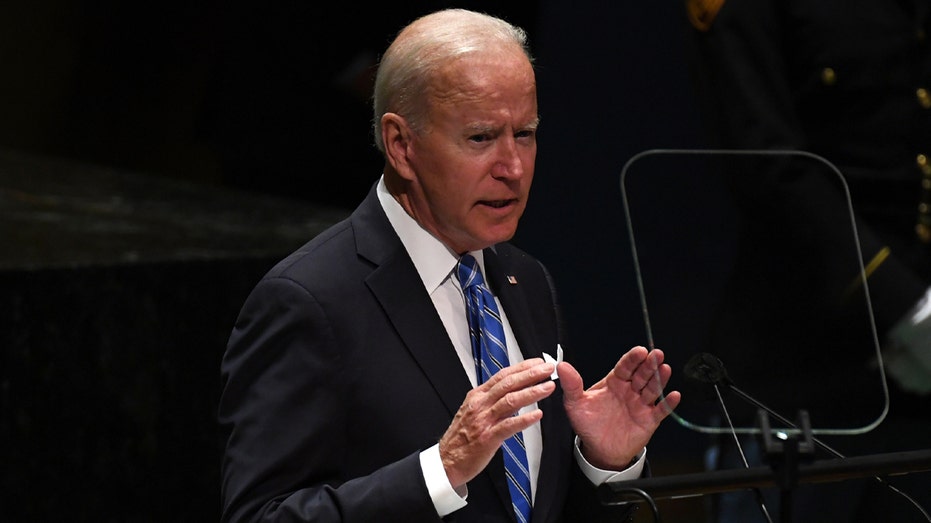Biden's proposed tax on unrealized gains of wealthy Americans draws skepticism
Biden's billionaire tax proposal could face legality challenge
Raising taxes will hurt our economy: Sen. Ron Johnson
Wisconsin Sen. Ron Johnson joins ‘Kudlow’ to discuss the current state of economy under the Biden administration as well as the anniversary of the Capitol riot.
President Biden renewed his push this week to overhaul the nation's tax code with a proposal to dramatically raise rates on corporations and ultra-wealthy Americans.
The president laid out the tax hikes as part of his $5.8 trillion budget blueprint for federal spending in fiscal 2023, which begins in October. Under his proposal, taxes would rise by $2.5 trillion, marking the largest increase in history in dollar terms. The deficit would be $1.15 trillion.
THESE STATES ROLLED BACK THEIR GASOLINE TAXES. OTHERS COULD FOLLOW
The higher taxes would largely be borne by Wall Street and the top sliver of U.S. households, in the form of a steeper corporate rate, a modified wealth tax and a global minimum tax.
But one aspect of his proposal – a minimum 20% tax on the unrealized gains of U.S. households worth $100 million or more – is drawing skepticism from tax experts.
John Gimigliano, the head of federal legislative regulatory services at KPMG, told FOX Business the proposed billionaire tax is "likely to be a slow burn."

Night falls at the the Capitol in Washington, Thursday, Dec. 2, 2021, with the deadline to fund the government approaching. Republicans in the Senate are poised to stall a must-pass funding bill as they force a debate on rolling back the Biden admini ( (AP Photo/J. Scott Applewhite) / AP Newsroom)
"It’s going to take substantial time for Congress to digest this proposal both intellectually and politically," he said. "It’s very difficult to find instances in the Internal Revenue Code in which Congress has chosen to tax unrealized gains – it’s almost taboo."
The so-called "Billionaire Minimum Income Tax" would raise $361 billion in revenue over 10 years and apply to the top 0.01% of households, or about 20,000 Americans. The White House said that roughly half the revenue stems from the country's 700 billionaires.
RECESSION INDICATOR FLASHES RED AS PARTS OF YIELD CURVE INVERT FOR FIRST TIME SINCE 2006
Under the proposal, the wealthiest Americans would be required to pay a tax rate of at least 20% on their full income, or the combination of wage income and whatever they made in unrealized gains. If a billionaire is not paying 20% on their income, they will owe a "top-up payment" that makes up the difference to meet the new minimum.
Households that are paying 20% will not be required to pay an additional tax.
Because many of the ultra-rich derive their vast wealth from the soaring value of assets like stock and property – which are not considered to be taxable income unless that individual sells – they are able to legally store their fortunes and reduce their tax liability. Under current law, a gain is only taxed if and when the owner sells the asset.
But taxing unrealized gains is a historically controversial idea that would almost certainly face legal challenges over the issue of whether the U.S. Constitution gives Congress the authority to tax wealth.

U.S. President Joe Biden addresses the 76th Session of the U.N. General Assembly on September 21, 2021 at U.N. headquarters in New York City. ((Photo by Timothy A. Clary-Pool/Getty Images) / Getty Images)
The proposal is "challenging from an implementation and enforcement perspective," said Mallon FitzPatrick, a CFP at Robertson Stephens. He noted that similar proposals floated last year by Democratic Sens. Elizabeth Warren and Ron Wyden were excluded from a larger spending bill lawmakers were crafting – like due to a lack of popularity.
"Congress still needs to vote and pass this ultra-wealthy tax," he said, "and there are likely many hurdles."
The concept is also relatively unpopular idea among Americans: A recent study conducted by two academics – Yale University Law School professor Zachary Liscow and University of Michigan Law School professor Edward Fox – shows that 75% of Americans oppose taxing unrealized gains.
"Though this opposition is strongest among those who are wealthier or own stocks, all demographic groups oppose taxing unsold gains by large margins," the study said.
GET FOX BUSINESS ON THE GO BY CLICKING HERE
It appears unlikely that Biden's plan to tax billionaires and ultra-millionaires will secure enough support from Democrats to pass the Senate, where the proposal would need the support of all 50 Democrats.
Sen. Joe Manchin, the pivotal West Virginia Democrat, called the idea a "tough one."
You can’t be taxed "on things you don’t have," he said, according to Bloomberg News. "You might have it on paper. There are other ways for people to pay their fair share, and I think everyone should pay."





















